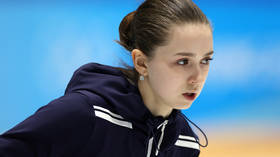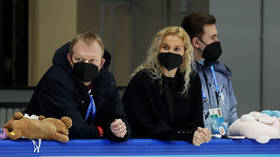US Olympic officials lash out after Valieva verdict

American Olympic officials have reacted angrily to the news that Russian figure skater Kamila Valieva has been cleared to compete at the Beijing Games, after the Court of Arbitration for Sport (CAS) refused to suspend the teenager in her doping case.
After a late-night emergency hearing in Beijing, CAS announced on Monday that gold medal favorite Valieva was free to line up in the women’s individual event which gets underway in the Chinese capital on Tuesday.
A CAS panel rejected requests from the International Olympic Committee (IOC), the International Skating Union (ISU), and the World Anti-Doping Agency (WADA) to reimpose a provisional suspension on the 15-year-old for a positive doping sample taken in December.
The results of the sample were only reported last week, after Valieva had already helped the Russian Olympic Committee (ROC) team to gold in the figure skating team event in Beijing.
Responding soon after Monday’s verdict, the US Olympic and Paralympic Committee (USOPC) claimed the decision undermined “clean sport.”
“We are disappointed by the message this decision sends,” read a message from CEO Sarah Hirshland.
“It is the collective responsibility of the entire Olympic community to protect the integrity of sport and to hold athletes, coaches and all involved to the highest standards.
“Athletes have the right to know they are competing on a level playing field. Unfortunately, today that right is being denied. This appears to be another chapter in the systemic and pervasive disregard for clean sport by Russia.
“We know this case is not yet closed and we call on everyone in the Olympic Movement to continue to fight for clean sport on behalf of athletes around the world.”
Attributable to USOPC CEO Sarah Hirshland: pic.twitter.com/wbGUIR67eS
— USOPC News (@USOPC_News) February 14, 2022
The IOC had said ahead of the CAS decision that it would accept the verdict from the three-person panel, which heard evidence from parties including Valieva.
Despite the immediate victory allowing Valieva to compete again in Beijing, investigations will continue into the positive test result she returned for banned heart medicine trimetazidine at the Russian national championships on December 25.
CAS also said it had not ruled on the status of the ROC’s gold medal in the figure skating team event, leaving the question open as to whether Valieva and her teammates stand to be stripped of the medal.
But in declining to reimpose a provisional suspension on Valieva, CAS cited the teenager’s status as a “protected person” under the WADA Code and also the “serious issues” caused by the delay in the positive test result being reported.
Valieva’s sample had been sent to a WADA-accredited lab in Stockholm, Sweden, but the result was only confirmed on February 8, after Valieva has starred in the team competition in Beijing.
She was provisionally suspended by Russian anti-doping officials, but had that decision lifted upon appeal – a decision which CAS refused to reverse despite requests from the IOC, WADA and ISU.
The teenager’s team – including coach Eteri Tutberidze – and Russian Olympic and skating officials have consistently said the skater is clean, asserting that she repeatedly passed doping tests before and after her positive result.
Aside from the anger from American Olympic officials, the head of the US Anti-Doping Agency (USADA) claimed last week that they could seek to prosecute anyone involved in Valieva’s case under the ‘Rodchenkov Act’ which was signed into law in 2020.
The act gives American prosecutors the power to seek fines of up to $1 million and jail terms of up to 10 years for actions affecting American athletes’ results in a bill that can be applied to non-Americans.
It is named after fugitive Russian doctor Grigory Rodchenkov, the former head of a doping control laboratory in Moscow, who claimed that Russia was running a state-sponsored secret doping campaign – something which Russian officials have refuted.













